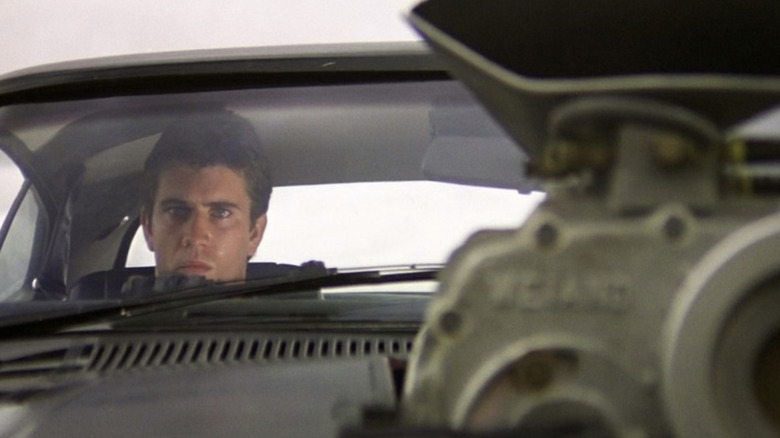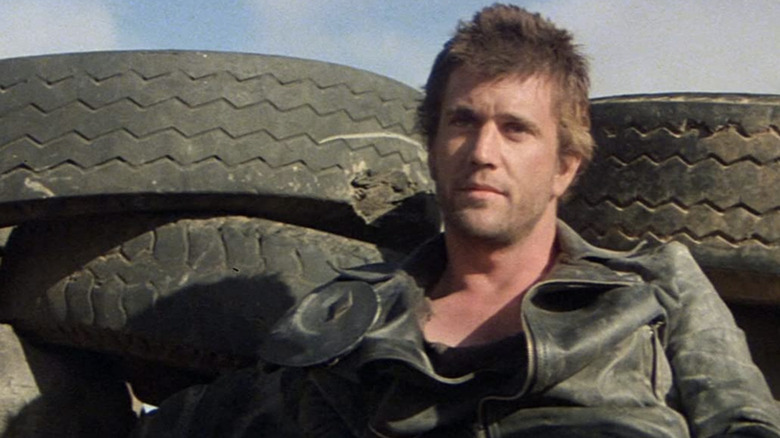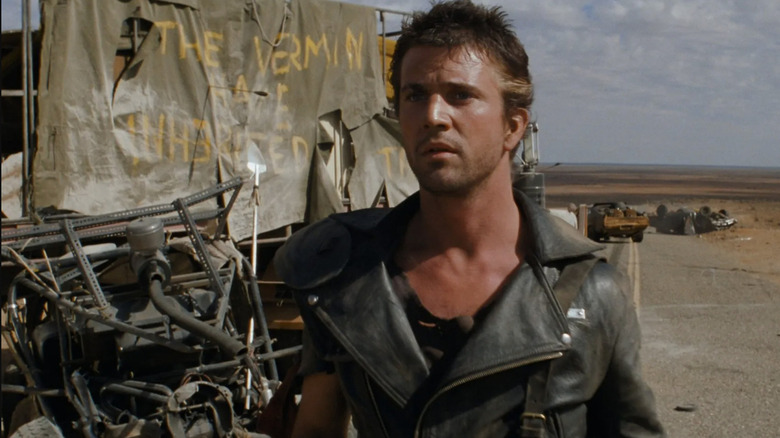Mel Gibson's Approach To Mad Max Could Be Summed Up In Just One Sentence
If there is one aspect of Max Rockatansky from the "Mad Max" films that could be considered the most intriguing, it's the timelessness of the character. Portrayed by two different actors throughout four films, the road warrior has become a figure closely associated with the post-apocalyptic aesthetic. Constantly going from one wasteland adventure to another, Max has been a lone nomad with no real sense of belonging, giving the high-octane action of the "Mad Max" films a melancholy tone.
Mel Gibson played Max for the first three "Mad Max" films, and his approach to the character helped shape Tom Hardy's eventual portrayal in 2015's "Mad Max: Fury Road." Before portraying Max, Gibson was not a well-known star, and his time with the character would become integral not only to the next actor playing him but would also help to shape the franchise as a whole. While filming the 1982 film "The Road Warrior," director George Miller would have a conversation with Mel Gibson about the character of Max, which would perfectly encapsulate what the character represents in the post-apocalyptic world of the film series.
'A closet human being'
In a 1985 interview for Time Out Magazine, "Mad Max" director George Miller would recount a conversation with Gibson about the character while filming "The Road Warrior." In particular, one thing Gibson said to Miller would stick with the director as a perfect encapsulation of Max as a character:
"And Mel Gibson suddenly said to me in Mad Max 2 [The Road Warrior], he said 'you know what he is? He's a closet human being.' And it really pretty well sums up Max for me. He's someone who denies his humanity, and sometimes it's going to come out, somehow. So I think he's sort of a pretty sad figure from that point of view."
"A closet human being" is the perfect way to describe the character of Max Rockatansky. Ever since the ending of the first "Mad Max" film, Max transformed himself into a savage survivor to not experience the same pain he did when he lost his family. Max hiding his humanity and trying to appear emotionless is a driving point for all of the films, especially in the latest installment, "Mad Max: Fury Road," which saw Max haunted by the sense of belonging he lost.
A mixture of compassion and brutality
Mel Gibson's approach to Max as a character also spoke to George Miller about the themes of the "Mad Max" series. As much as Max tries to keep his humanity closeted, the greater sense of community calls to the road warrior, which in turn propels the films to their impressive vehicular action:
"And yet, you have a sense that he's wise enough to learn. He finally learns, slowly, that you can't live by yourself. You're part of the community, like it or not. That we're all sort of vaguely responsible for each other, and he sort of understands that. There are purposes outside of the individual's life or existence. I think [Max] somehow understands that, and it probably makes him more compassionate – at the end of Mad Max 3, at least. That might be the difference; maybe he has compassion ultimately, in spite of doing all these sorts of fairly brutal things."
Max's compassion is a stark contrast to his brutality in the films, and that's part of what makes the "Mad Max" films work so well. The world-building in these films paints a picture of a brutal post-apocalyptic world, with the brutal characters in the film going against the small hopes for humanity. For all his brutality, Max decides to use it to express his closeted humanity, protecting and fighting for communities that thrive on togetherness instead of isolation and violence. Gibson's interpretation of Max as a closet human being is the perfect way to describe the character.


